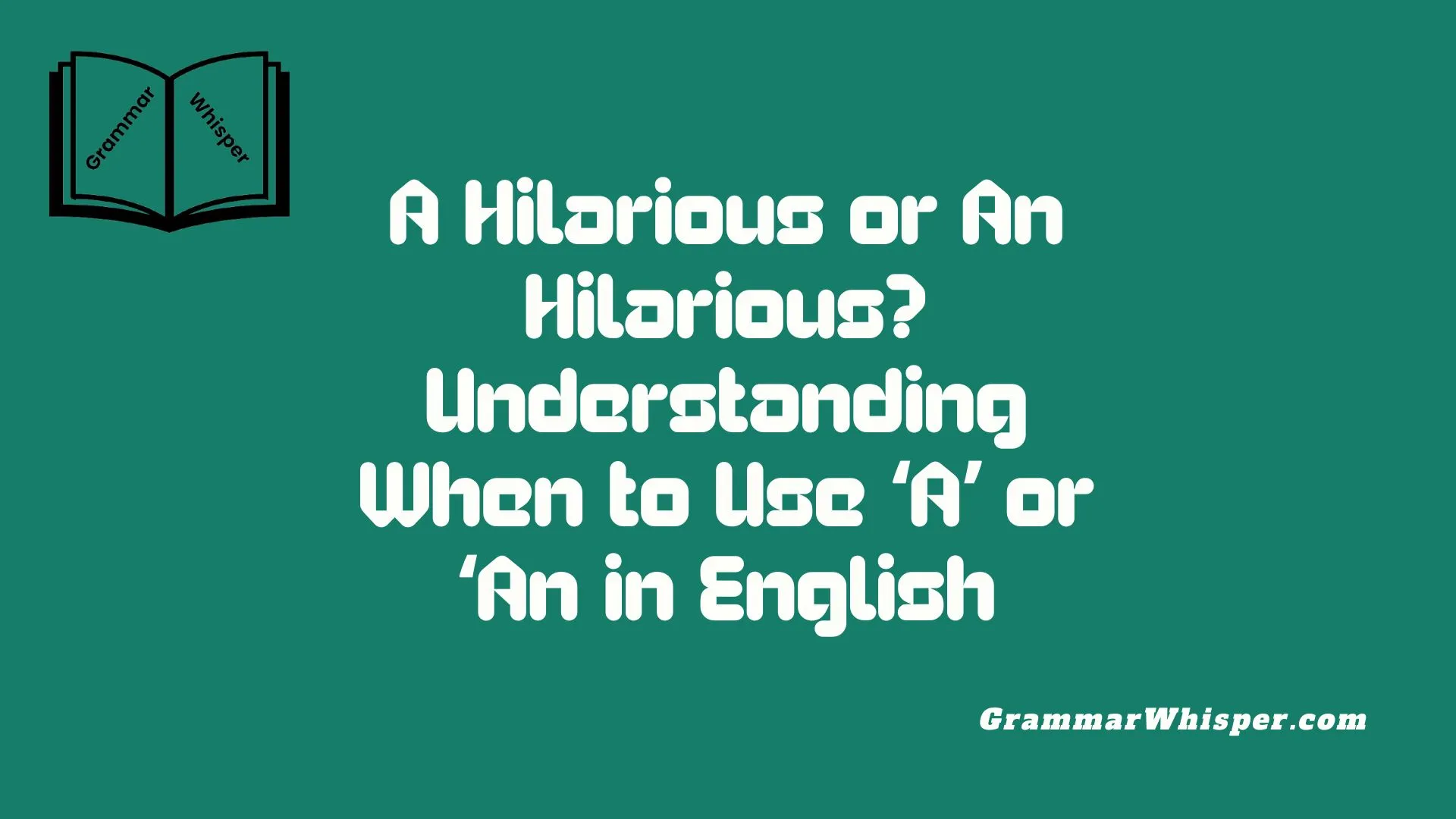English grammar is full of subtle rules that can trip up even the most seasoned speakers. One of the most common – and easily overlooked – mistakes is choosing between the indefinite articles “a” and “an.” While these two articles serve a simple purpose, many English learners and even native speakers occasionally struggle with the correct usage, especially when it comes to certain words starting with “h.”
In this post, we will dive deep into the question: “A hilarious or an hilarious?” We’ll explore why this confusion arises and clarify the rules for using “a” and “an” in English. By the end of this article, you’ll have a clear understanding of how to use these articles correctly in every situation, avoiding the common mistakes that many make.
What Are Indefinite Articles?
Before we dive into the specifics of “a” and “an,” let’s first define what indefinite articles are and how they function in English.
Indefinite articles are used to refer to non-specific items or things. In simple terms, they don’t point to any particular object, person, or thing but rather indicate any member of a group. There are two indefinite articles in English: “a” and “an.”
- “A” is used before words that start with a consonant sound.
- “An” is used before words that start with a vowel sound.
Why is this important?
Using the right article helps make our language sound natural and fluent. For example, imagine saying “a dog” instead of “a dog.” The phrase sounds awkward and incorrect to native speakers. The choice of article influences both meaning and pronunciation.
The General Rule for ‘A’ and ‘An
The rule for when to use “a” or “an” is pretty straightforward:
- Use “a” before words that begin with a consonant sound.
- Use “an” before words that begin with a vowel sound.
It’s important to note that the sound is what determines the article, not the actual letter. Let’s look at a few examples:
| Word | Correct Article | Explanation |
| “apple” | an apple | Starts with a vowel sound (‘a) |
| “banana” | a banana | Starts with a consonant sound (‘b’) |
| “hour” | an hour | ‘H’ is silent, so it starts with a vowel sound |
| “unicorn” | a unicorn | Starts with a ‘yysound (consonant) |
As seen in the table above, it’s the sound that matters more than the actual first letter of the word.
The Great ‘H’ Debate: When to Use ‘A’ or ‘AAnNow, let’s focus on the tricky part: words starting with “h.” This is where many people get confused, especially with words like “hilarious.”
Some words that begin with “h” are pronounced with a soft “h” sound (e.g., “hour” or “honor”), which leads to a vowel sound following the article. In these cases, “an” is used because the next sound is a vowel. Other words, like “hilarious,” have a pronounced “h” sound, so the article “a” is used.
Here’s a quick breakdown:
When to Use ‘A’:
- Words that begin with a pronounced “h” sound, such as:
- a hilarious
- a hotdog
- a house
- a history book
When to Use ‘An:
- Words with a silent “h” or a soft “h” sound, such as:
- an hour
- an honor
- an heir
- an Honest mistake
‘A Hilarious’ vs. ‘An Hilarious’ – Where’s the Confusion?
The phrase “a hilarious” is one of the most common spots where confusion arises. “Hilarious” starts with “h,” but it’s important to note that the “h” in “hilarious” is pronounced. Thus, the correct choice is “a hilarious,” not “an hilarious.”
Why is “An Hilarious” Incorrect?
It’s easy to assume that because “hilarious” starts with a vowel letter (h), it should follow the “an” rule. However, the critical factor is pronunciation. The “h” sound is clear, not silent, so “a” is the right article.
Let’s look at a few examples:
- Correct: He told a hilarious joke.
- Incorrect: He told a hilarious joke.
You can hear the difference when pronounced aloud. The “h” sound is strong, making “a” the only correct choice.
Crafting Sentences with “A Hilarious”
To further illustrate when and how to use “a hilarious” correctly, here are some sample sentences:
- “It was a hilarious movie.”
- “She gave a hilarious speech at the party.”
- “The comedian told a hilarious joke that had everyone laughing.”
Notice in each of these examples, the “h” sound in “hilarious” is pronounced clearly. Because of this, “a” is the appropriate article to use.
Why is “A Hilarious” Correct?
The rule here is simple: “hilarious” starts with a consonant sound (the “h”), and this pronunciation guides us to use “a.” Even though “h” can be silent in some words, such as in “hour” or “honor,” it’s important to always pronounce the “h” sound in “hilarious,” making “a” the correct choice.
The Misconception of ‘An Hilarious’
You may have heard people say “an hilarious” and wonder why it sounds odd. It’s a common misconception, primarily because people mistakenly apply the “an” rule based on the spelling of the word rather than its pronunciation.
So, why do some people get it wrong? Here’s why:
- Spelling vs. Sound: People often focus on the “h” at the beginning of “hilarious” and think that the article should be “an” because it starts with a vowel letter. However, it’s the sound that matters, and the sound of “hilarious” begins with a consonant (“h”).
- Confusion with Silent Letters: Some people might incorrectly assume that if “h” is involved, it must be a vowel sound. For example, in words like “hour” or “honor,” the “h” is silent, making them follow the rule for “an.”
Common Errors:
- “A hilarious moment” (incorrect)
- “AA history lesson” (incorrect)
Common Errors with H-Words
The confusion doesn’t stop with “hilarious” – there are other common h- h-h-h-who-wordshat people often get wrong when selecting “a” or “an.”
Here’s a quick list of h- h-h-h-words that can cause trouble:
| Word | Correct Article | Explanation |
| “historic” | a historic | “H” is pronounced (hard “h”) |
| “honor” | an honor | “H” is silent |
| “herb” | a herb | “H” is pronounced (hard “h”) |
| “hour” | an hour | “H” is silent |
The Role of Sound in Article Selection
Sound is the determining factor for whether you use “a” or “an.” Here’s the key takeaway: focus on the pronunciation, not the spelling.
For example:
- “A university” (not “an university”), because the “u” in university sounds like “you,” a consonant sound.
- “An umbrella” (not “a umbrella”), because the “u” in umbrella starts with a vowel sound.
Quick Recap of Sound-Driven Rules:
- Use “a” when the word begins with a consonant sound.
- Use “an” when the word begins with a vowel sound.
The ‘Exception’ to the Rule: Silent H
As we mentioned earlier, some words start with a silent “h,” and in these cases, the rule for using “an” applies. This is a common exception to the usual rule for “a” and “an.”
Examples of Silent H:
- An hour
- An heir
- An honest mistake
In these cases, even though the word starts with “h,” the “h” is silent, so we use “an.”
The Importance of Pronunciation in Article Selection
Correct pronunciation is central to using articles properly in English. Mispronouncing words or ignoring the rules for silent letters can lead to incorrect article choices.
Practical Tips for Mastering Article Usage:
- Practice pronunciation: Ensure that you pronounce words correctly, especially those with tricky beginnings like “h.”
- Listen to native speakers: Pay attention to how they use articles when speaking.
- Use phonetic guides: When in doubt, consult a dictionary or an online pronunciation tool to understand how words are pronounced.
Conclusion:
In summary, the use of “a” and “an” is determined by the sound that follows the article, not the spelling. When it comes to words like “hilarious,” the “h” is pronounced, so the correct article is “a.” “An” is used only when the “h” is silent or when a vowel sound follows the article.
By mastering this simple rule, you can improve both your writing and speaking skills. Next time you’re about to use “an hilarious” in a sentence, remember: it’s “a hilarious” – your grammar will thank you!
Call to Action: Got any other questions about articles in English? Or maybe you’ve made a mistake like “hilarious” before? Drop a comment below and share your experience. And if you found this post helpful, don’t forget to subscribe for more grammar tips and language hacks!
FAQs
Why do we use “a” before “hilarious” and not “an”?
The choice between “a” and “an” depends on the sound that follows the article. Since “hilarious” starts with a pronounced “h” sound (not a silent one), the correct article is “a.” Using “an” would only be appropriate if the word started with a vowel sound, such as in “an hour” or “an honest mistake.”
What is the rule for using “a” and “an” with words starting with “h”?
The rule is straightforward:
- Use “a” when the “h” is pronounced, as in “a hilarious” or “a history lesson.”
- Use “an” when the “h” is silent, as in “an hour” or “an heir.” Always focus on the pronunciation, not just the letter.
Can “an” ever be used before a word starting with the letter “h”?
Yes, “an” can be used before words starting with “h” when the “h” is silent. For example, “an hour” and “an heir.” Even though these words start with the letter “h,” they begin with a vowel sound because the “h” is not pronounced.
How can I improve my understanding of when to use “a” and “an”?
To master when to use “a” and “an,” focus on listening to native speakers and pay close attention to pronunciation. You can also use phonetic guides in dictionaries, which indicate how words are pronounced. Practice speaking aloud to reinforce the sound-based rules.
What other common mistakes are made with “a” and “an”?
Common mistakes include:
- Saying “an” before words that begin with a consonant sound, like “an dog” (it should be “a dog”).
- Saying “a” before words that begin with a vowel sound, like “a umbrella” (it should be “an umbrella”). Always focus on the sound that follows the article to avoid these errors.











